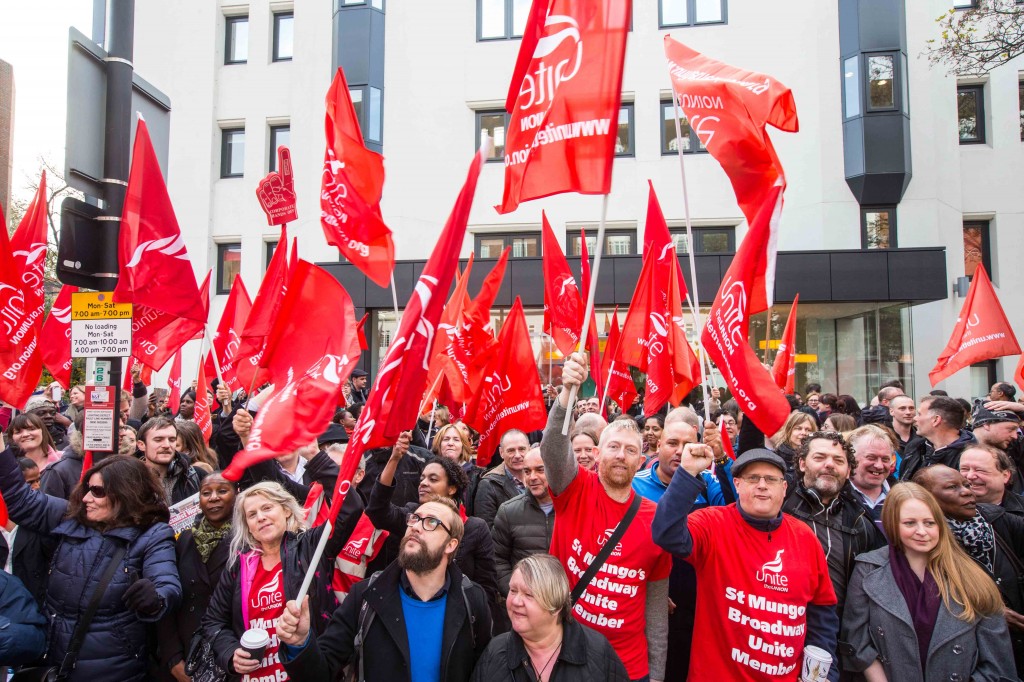Almost two in five (38%) of the British public back charity workers taking strike action over pay and conditions, a survey has found.
This is a greater proportion than the almost three in ten (28%) of the public opposing charity workers taking industrial action.
The findings have emerged as indefinite strike action by 500 workers at St Mungo’s continues after management’s latest pay offer was rejected.
The survey of 1,000 people on their views on industrial action has been carried out by consultancy nfpResearch.
It found that only health staff and teachers gained greater support than charity workers among the public for taking strike action.
The proportion of the public backing charity workers striking is greater than those supporting trikes by civil servants, university staff and train drivers.
The most supported group when it comes to strike action is nurses (62%), while the least supported is barristers (25%).
“Public support is vital to striking workers, and can play a significant role in dictating the outcomes of their disputes,” said nfpResearch managing director Cian Murphy.
“Our advice to the charity sector applies universally - that public support relies on clear and
continuous communication about your goals.
“Ongoing dialogue is the best way to keep the public onside, and to remind them of what’s at stake for the real people being forced to strike.”
St Mungo’s strike action to continue
Workers at St Mungo’s represented by Unite the union have rejected the latest pay offer made by the homelessness charity’s management this week.
The decision means workers’ indefinite strike action will continue amid the two-year dispute, which has seen the union boost its membership among workers at the union by a further 300.
Unite has described the charity’s latest pay offer, from its original 2.25% offer to 3.7% as “paltry”. Workers rejected this latest offer by a margin of 62%.
The union has branded the offer as “divisive” amid allegations among its reps that “bosses offered as little as possible to get the deal over the line and split the workforce”.
“@StMungo’s latest pay offer was a cynical attempt to divide the workforce and break the strike. That tactic has crashed and burned. So my advice is to get real and offer a fair pay increase to help these dedicated workers make ends meet.” @UniteSharon https://t.co/8hKbmPFcFE
— Unite the union: join a union (@unitetheunion) July 6, 2023
“St Mungo’s latest pay offer was a cynical attempt to divide the workforce and break the strike,” said Unite general secretary Sharon Graham.
“That tactic has crashed and burned. So my advice is to get real and offer a fair pay increase to help these dedicated workers make ends meet. The workforce continues to have their union’s total support.”
Unite regional officer Steve O’Donnell added: “Unite regional officer, Steve O’Donnell said: “It’s plain wrong that workers on the frontline of the fight against homelessness are living in fear of not being able to pay the rent. If management took our advice and made that additional offer, that we proposed at ACAS, people would be on their way back to work.”
“Management need to stop wasting time tinkering and make a real pay offer.”
The indefinite strike began on 27 June and previous talks last month had broken last month amid allegations that St Mungo’s chief executive Emma Haddad lost her temper and shouted at workers.
A spokesperson for the charity said it had nothing further to add to its statement last month that they are aware of the allegations raised about Haddad which “are being taken seriously in line with our existing procedures”.
Haddad said the charity is “extremely disappointed” its workers had rejected the pay offer.
“We understand the pressures that the cost living crisis is placing on some of our colleagues, and we went to great lengths to put forward a comprehensive 10-part package,” she said.
“This included a new consolidated pay offer designed to support colleagues and significant improvements to the wider benefit package.
“Had the offer been accepted, over 90% of colleagues would have received a minimum increase of £2,975 for the current financial year when added to the annual pay award. In percentage terms, this would have meant a pay rise of 7-14%.
“We have made a series of payments and offers that attempt to support colleagues through this difficult period. All our offers have been additional to the annual pay rise.
“It is highly regrettable Unite has not accepted the latest offer at a time when the demand for our services is increasing. We need to ensure the charity is sustainable going forward so we can continue to deliver services to some of the most vulnerable people in society.”





.jpg)







Recent Stories